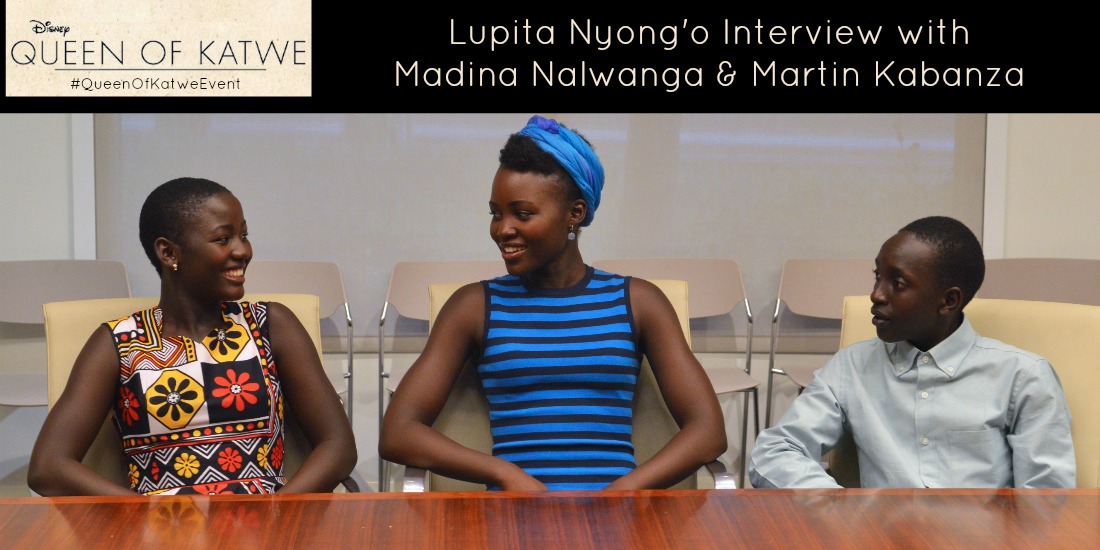
I mentioned how fierce Lupita Nyong’o is as Harriet, the mother of Phiona Mutesi (Madina Nalwanga) in Disney’s latest film Queen of Katwe. I have had the opportunity to interview Lupita Nyong’o three times now. Each time I feel like she’s grown so much in life experience, and it’s all happened in the past nine months.
For Queen of Katwe, Lupita, along with newcomers Madina and Martin Kabanza playing, Phiona’s brother Brian Mugabi, sit down and share what this experience was like for the three of them. You can easily see that the bond they share onscreen is unique, but the off-screen adoration those two kids have for Lupita is one that goes deeper than the family they portray.
Lupita Nyong’o
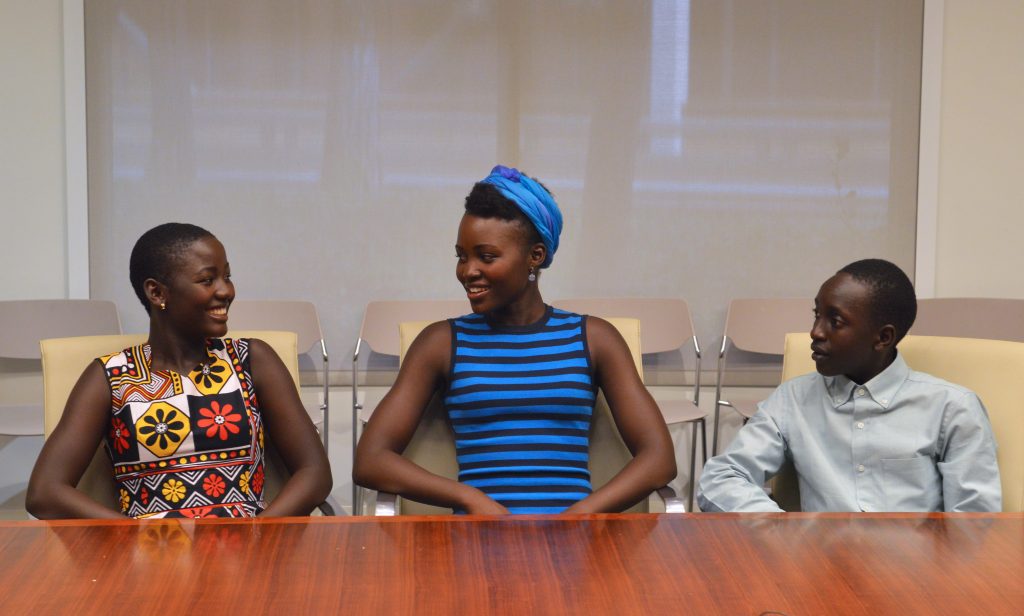
photo credit Carol Jones
What was it like for the three of you to work together?
Luptia: We like each other. And we had a lot of fun together. I had met them before we started shooting. It was a long process for Madina to be cast and then when she was finally cast, I walked into a rehearsal workshop situation where they had my whole family there, and I walked in and she just, she said, “Hi Mom!” I gave her a big hug. They were both just so receptive to me, and Madina taught me how to cook. She sold corn in her past, and I asked her to show me to go shopping in the market. How she’d do it, and she did all the shopping. My whole onscreen family, we went and did it together and then we went back to her house, and she showed me how to prepare the meal. And we all played a role in the preparation of the meal. We broke the ice that was, and we had a really great working relationship. They’re really hungry, curious and present as actors, and it was so lovely for me to have that kind of immediate condition to work in with them.
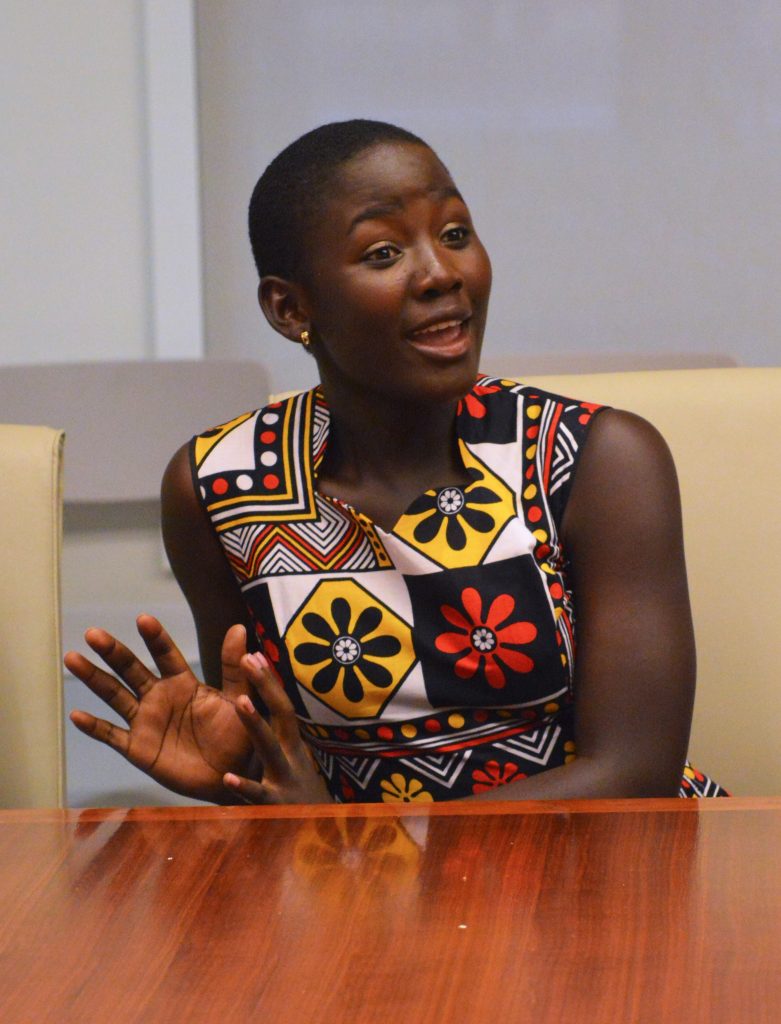
Photo credit Carol Jones
Medina: It was my first time acting, but I never knew anything about acting, but she taught us how to get into character. She was a good mom. And I used to copy her, and I named myself copycat because every time I could see her getting into her character I would do what she was doing in quiet ways and she couldn’t see me. She was really good, and she really helped me in some of the hard scenes that are really hard because I could not really cry because you’ll never find dancers sad. We are always happy, and she was there for me to make sure that I get into character so that I can cry. She helped me so much.
Medina explains about being a dancer since she was four, her mom wasn’t a presence in her life.
Medina: That’s why I still call her mom. Ever since I was young and left my mom because she wanted me to go to school, I’ve never had anyone else that I’ve ever called Mom since I was four up to last year. So she was the first one to be called mom from my mouth, and it was so nice for me to call her mom. And she really acts it. So it was really nice for me to meet her. She was amazing to me, and when I called mom for the first time, she replied to me, and I got touched, (pointing to her heart) inside my heart.
Martin: To add to what Medina is saying. Look, I was raised by my grandparents. My mother left me when I was three months, so, for me too, because my first time to say “mom” from my mouth.
Lupita looks around the room at us with tears streaming down her face. The love she has for these two is evident. She has become a mother they’ve never had.
The film is so touching and inspirational. Any scenes that stand out more than the rest for you?
Lupita: Touching, my goodness. What wasn’t touching? I do remember once we were about to shoot the eviction scene. We had a tent where we’d wait, and these two were very quiet, quite pensive, and I asked them how they felt. And they both mentioned how this was their life. They both experienced evictions in their past, and I just remember being really moved at how this, the artifice was reflecting the real life for Phiona (Mutesi), but also real for both of them. They had this chance to tell their story to bring it to a larger audience that would understand the challenges of poverty. But also the triumph of people who live through it and the fact that poverty is no one’s definition and they were going to have this chance to put that experience of their past into very good and immediate use in the scene were about to shoot. I come from a very different background. One of privilege and so I was very humbled during that moment.
Here I am playing the mother and being the shepherdess of these two going through this experience, and yet, I was learning so much from them. I was just humbled by that moment and being able to take their lead as we went to do that scene.
Lupita, you have graced the cover of Vogue now three times. What was the last cover shoot experience like for you? Going back home and including your sweet grandmother.
Lupita: How to bring words to that moment. I was just so touched when Vogue said they wanted to do another cover with me, of course, I was like elated, Then they said, we would love it to be about you in a different kind of way, and they were interested in making a trip to Africa. Then I said the only place go was home. It’s home the place that means the most to me. My village where my grandparents are, and it’s my ancestral home, I spent my vacations there as a child, and it’s where my whole extended family would come to pass the holidays together. So to see that place, that light, that equatorial light on the cover of Vogue and to find my grandmother in the pages inside, I mean, I was just like. “Oh my God,” it was everything I hoped it would be. And more because that part of Kenya is known to be a tourist destination. I mean, we have all the wildlife, and that attracts hundreds of thousands every year. But Kisumu, the Western part is not a tourist darling at all, and yet, it’s magnificent. With the rock formation of Kitmekai and just the colors. Lake Victoria. The fishing. And it’s the thing that actually brings Uganda and Kenya together. We share the Lake Victoria, and we shot Queen of Katwe on one side of Lake Victoria, and you see that in the film. The Vogue shoot was on the other side of it, and so for me, that was a tie-in, and it was a thing that I felt brought the film and me being on the cover together.
Did you have to learn Luganda?
Lupita: I didn’t know any Luganda. These guys were my teachers. What was so great about being in Uganda is that I got to immerse myself in the culture. I had to learn Luganda because at first I came to Uganda and I was like, “I’m gonna pick up a few Luganda words,” and then I was introduced to Baby Ivan who plays Baby Richard. He didn’t speak any English. The first time he was given to me; he went right back to the person who gave him to me because he didn’t trust me and I couldn’t have a conversation with him, and then I realized that Luganda was my lifesaver. I got to work learning Luganda, and I would ask all the time how to say things and write them down, and I needed to say very basic things to this boy like, do you need to pee? Are you hungry? Stop doing that. Keep quiet. Yeah, so it came in very, very handy and I loved learning it.
Medina and Martin on David Oyelowo
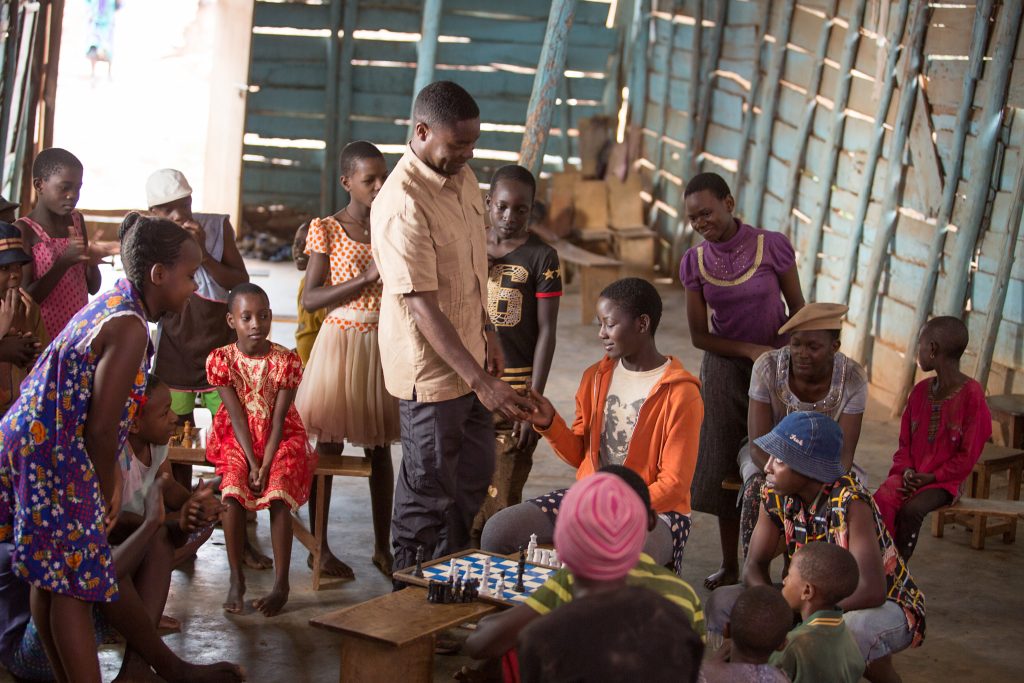
What was it like to work with Davie Oyelowo?
Medina: My favorite part of the movie was seeing David running around doing the cat and dog scene because not in my life have I’ve ever had someone who has time for me, who has time for all of us. Like, he had time for us so that he could do the cat and dog playing for us and I looked at him. It was fun for me. I liked it, but I felt it because I felt it because ever since, for all of my life, I’ve never had someone like that. And he had time for us, so I respected him, his time and I enjoyed watching what he was doing for us, and it was so amazing to see him jumping. Jumping over the bed, collapsing so that was my favorite.
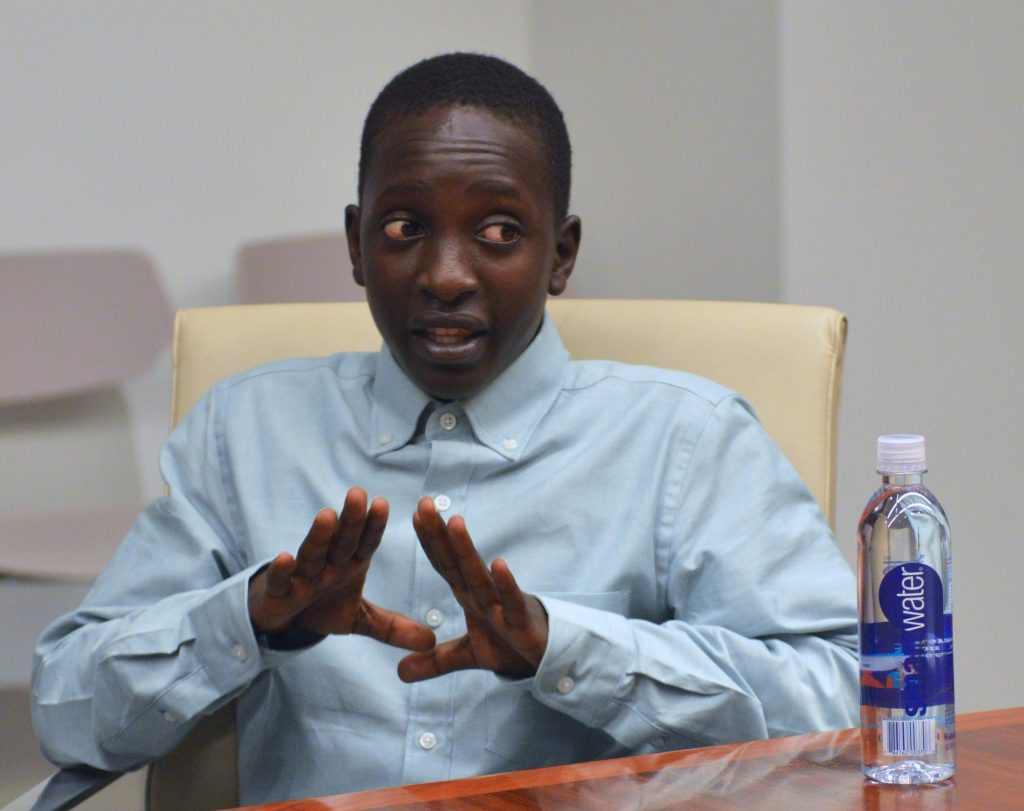
Photo credit Carol Jones
Is there a scene that you shot that you’d like to share the experience?
Martin: One scene that I liked in the movie is the flood scene. I like Mama doing it. She was so real and me, I didn’t have that power of crying, but she made me cry in that scene because she was so real.
We were all crying watching that scene.
Lupita: It was really cold, and we shot that in South Africa over four days and it was the winter time in South Africa, so it was a little shy of thirty degrees. We get to set, get into our costumes, go into a hot tub, get wet and then go into this freezing cold water all day and every time they said, cut, we’d run to this hot tub. And just sit in and then we got all muddy because of the mud in the water and we’d just sit there and like, sing and talk and play until we had to go again.
Madina: I also had this scene where Martin is to be knocked by a boda-boda (motorbike). It was so bad for me because I had an accident with a car when I was little, so I saw a human being knocked down, so I knew it happens and how it feels to see someone in that much pain. So it was so, so bad for me and to make me remember the conditions that I was in when I was knocked down by a car, so that was my favorite scene.
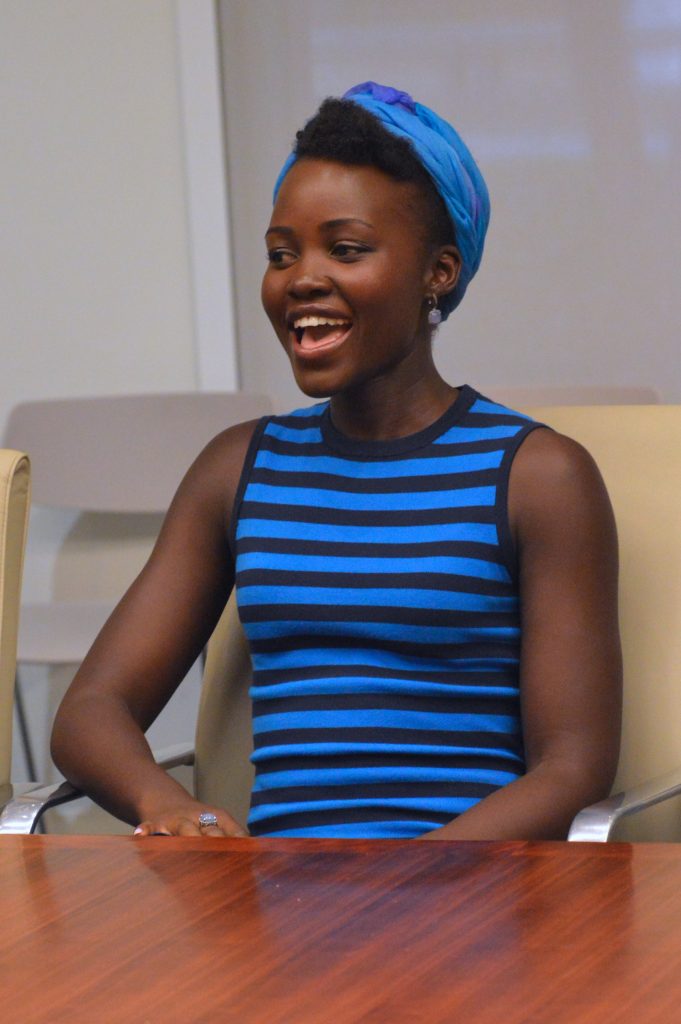
Photo Credit Carol Jones
You seem to prefer roles with stories that are waiting to be told. What do you hope to bring to the forefront in playing those roles?
Lupita: Well, I love playing roles that stretch me and help me to learn something new and deep about the human experience. It was not by design that I set out to play African women, but how happy I am to have had these opportunities because I think Africa all too often is a blanket statement. There’s no specificity. It’s a very general wash of ideas that people have of this continent where I’m from. I know by being from there that there are many splendors. So to be able to bring that to the forefront of the stories, particular and specific stories about African women in their variety is so exciting to me because I’m a child of a global popular culture. I grew up watching Mexican, Brazilian, Australian, English, American TV, and cinema. I think I was able to identify with all those people that I met and learn something new about those cultures. I’d never worn a winter coat, but I know when you’re in New York, you have a winter coat. So for an African story to be playing that same kind of role being a universal story still. It’s specificity as we find with Phiona Mutesi in this story of Queen of Katwe, it is my pride and my joy. I am so happy to be able to play a part in making the African woman the global woman.
Lupita is doing an amazing job portraying the global woman, and one thing you can’t read, but only feel from being in the presence of these three is the adoration. As the kids spoke of calling Lupita mom, she cried. We all did. Their lives have been changed from being in this extraordinary film forever, and for them, Lupita will always have been a mom, even if it’s for a short pivotaltal time of their lives.
Queen of Katwe is now open in U.S. theaters in limited release today expanding nationwide September 30, 2016.
Facebook | Twitter.com (#QueenOfKatweEvent) | Instagram | Website
*I was invited by Disney to experience the Queen of Katwe press event to share my experience. All opinions are my own.
- You Have to Remember – 9/11, 20 Years Later - September 11, 2021
- Creating the Perfect Look with a Maxi Dress - October 20, 2020
- Brand Better Giveaway - October 6, 2020


Leave a Reply